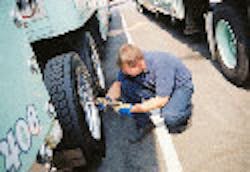Fleet finds nitrogen beats air
A nine-month double-blind study conducted by a large private fleet saved 110,000 gallons of diesel with a nitrogen tire inflation program, according to a paper prepared for the annual Clemson University Tire Industry Conference. The study also uncovered substantial gains in tire tread life and a reduction in greenhouse gas emissions that could be exchanged for revenue on carbon trading markets.
Running 70 tractors and 117 trailers in longhaul operations, the Drexan Corp. found the nitrogen system improved fuel efficiency by 3.1% compared to a tire pressure maintenance program using air and 6.1% compared to no tire pressure maintenance program.
The test also found that the nitrogen-fill also extended average tread life by 86% compared to an air-fill tire pressure maintenance program. In addition, the study results “inferred” longer casing life and fewer tire failures with nitrogen.
Nitrogen permeates through tire casings more slowly than ambient air, which means nitrogen-filled tires maintain optimum pressure longer, potentially improving fuel economy and tire life. An inert gas, nitrogen is also drier than ambient air, which can help preserve tire rubber and protect casings from corrosion damage.
The private fleet’s study accumulated 6.1 million tractor miles, which translates into 110 million tread miles with 1,988 wheel positions. The test period also covered both the hottest and coldest months of the year to minimize climate variations, according to the study. Data analysis was used to isolate the impact of inflation gas, according to the paper.
Drexan is Canada’s largest distributor of Parker Hannifin Corp.’s TireSaver nitrogen generator, which was used for the fleet’s study.
